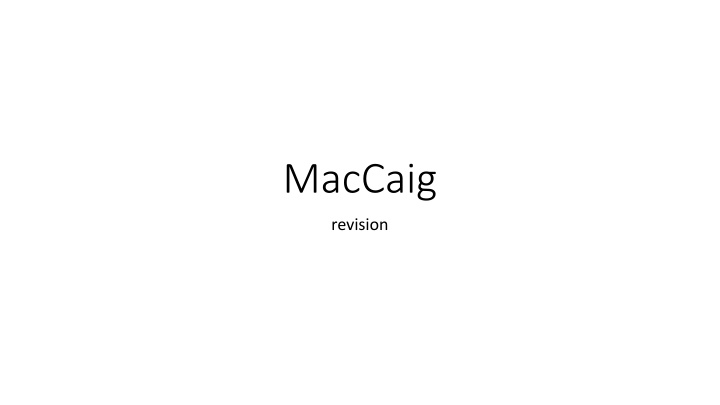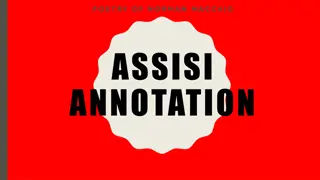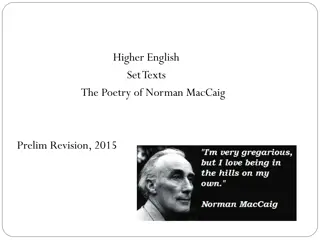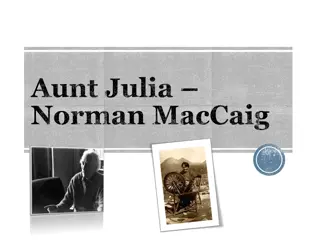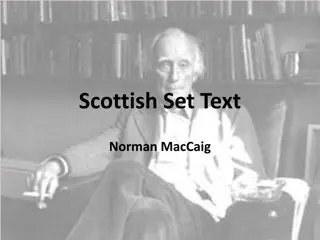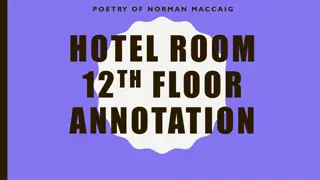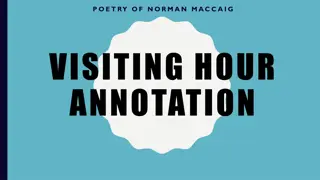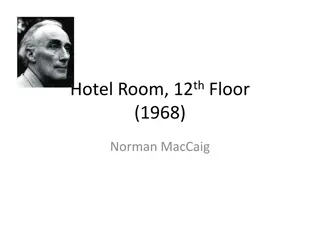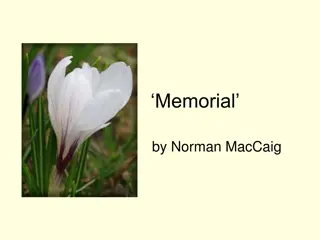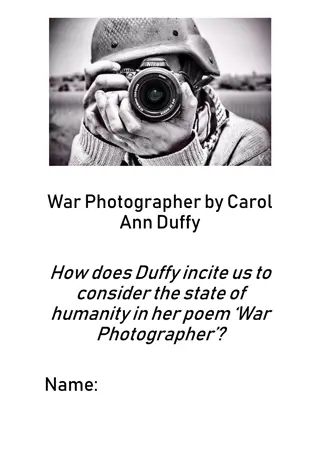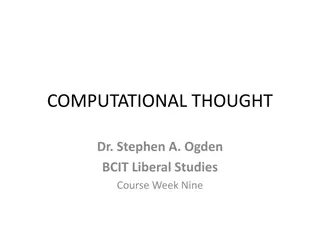MacCaig's Reflections on Society and Humanity
MacCaig's poignant poems, such as "Brooklyn Cop," "Hotel Room 12th Floor," and others, delve into the complexities of society, violence, relationships, and the human condition. Through vivid imagery and thought-provoking themes, MacCaig challenges readers to reflect on the fragility of civilization, the impact of technology, and the persistent presence of darkness and violence in human existence.
Download Presentation

Please find below an Image/Link to download the presentation.
The content on the website is provided AS IS for your information and personal use only. It may not be sold, licensed, or shared on other websites without obtaining consent from the author.If you encounter any issues during the download, it is possible that the publisher has removed the file from their server.
You are allowed to download the files provided on this website for personal or commercial use, subject to the condition that they are used lawfully. All files are the property of their respective owners.
The content on the website is provided AS IS for your information and personal use only. It may not be sold, licensed, or shared on other websites without obtaining consent from the author.
E N D
Presentation Transcript
MacCaig revision
Poem Summary Brooklyn cop MacCaig portrays the imposing presence of a New York policeman. In doing so, MacCaig considers the fragile nature of society and the challenges that it can pose. Hotel Room 12th Floor From his hotel room in New York during a trip in the mid-sixties, MacCaig considers the nature of society, and whether it has come as far as its technological advances would suggest. Basking Shark This poem compares the evolutionary paths of basking sharks and humans. The sharks lives remain relatively unchanged for millions of years, but humans lead vastly changed lives. Aunt Julia This poem evokes Norman MacCaig's warm memories of his Aunt Julia. She lived in a croft on a small island in the Outer Hebrides, speaking no English, only her native Gaelic language. Assisi Norman MacCaig's poem describes a visit to the Basilica of St. Francis of Assisi. The basilica's role as a landmark is contrasted with the Christian ideals behind its construction. Visiting Hour Visiting Hour describes a visit to someone who is dying in hospital. The speaker tries to maintain his composure in order to prevent revealing his worry and fears to the person he is visiting.
Brooklyn Cop Summary: The poem focuses on one particular character, an un-named Brooklyn police officer. However, this poem is not a character sketch. It concerns the dangerous and violent world that policemen in New York, or anywhere in the world can face. By portraying the cop as both a threatening animal and as a vulnerable human being, McCaig questions how civilised modern society is and suggests the dehumanising nature of violence. Although the policeman is imposing and strong, we also see him as being vulnerable and human. His exchanges with his wife underline the severity of the dangers that he faces each day. Structure: Stanza One - builds the cartoon-like image of a stereotypical cop. Stanza two - shows how how quickly the cop could be thrust from safety into chaos and how violence is always present in his world. Stanza Three - written as a rhetorical question and is ambiguous. It leaves the reader to question his policing, and his "victims". It is important to note the stanzas become shorter and much more condensed. This reflects the poet grasping at different ideas and becoming lost. Themes: Isolation, Violence, Emotions, Relationships, Death, Reflections
Hotel Room 12thFloor Summary: Hotel Room, 12thFloor ponders the balance between light and dark, good and evil and humanity s role in a developing urban society. Though the poem begins with light-hearted imagery, with the Empire State Building compared to a jumbo size dentist s drill, the mood gradually becomes more sombre and reflective, with the ominous conclusion that no stockades can keep the midnight out as humans seek shelter from the uncivilised darkness that night brings. By tracing the thread of violence throughout American history to the present, MacCaig suggests that technological progress has not resulted in societal civility. In this sense, this is a bleak poem that predicts that evil will always exist as a part of human life. Structure: Stanza One reflects how the city looks in the morning and focuses on the bright, modern appearance of the city. MacCaig moves to night at the close of the stanza to suggest a darker, more dangerous city. Stanza Two explores this threatening night world in more detail and links it to the Wild West. The shortest of the stanzas, Stanza Three is an effective summary of the poem's themes, bringing together societal concerns. It documents a personal experience of MacCaig s like Aunt Julia and Basking Shark but, like both of these poems, its concerns are not limited to MacCaig he uses the poem, and his own experiences described, to pose broader questions about humanity. Themes: Isolation, Violence, Emotions, Death, Reflections, Human condition
Visiting Hour Summary: In Visiting Hour, the speaker describes a visit to a dying friend/wife in hospital. In the poem, the speaker is determined to maintain his composure in order to prevent transmitting his worry and fear to his friend. This attempt to switch off his emotions, however, is ultimately unsuccessful and in the end he is forced to confront the reality of both his own and his friend s mortality. Structure: The poem is a stream of consciousness from a first person stance which allows us to experience the emotions of the speaker as he is feeling them. It is written in free verse and the present tense, and follows the chronological order of the visit. MacCaig often employs the techniques of enjambment and repetition in this poem to emphasise the central ideas. Themes: Isolation, Loss, Emotions, Relationships, Family, Death, Fragility of life
